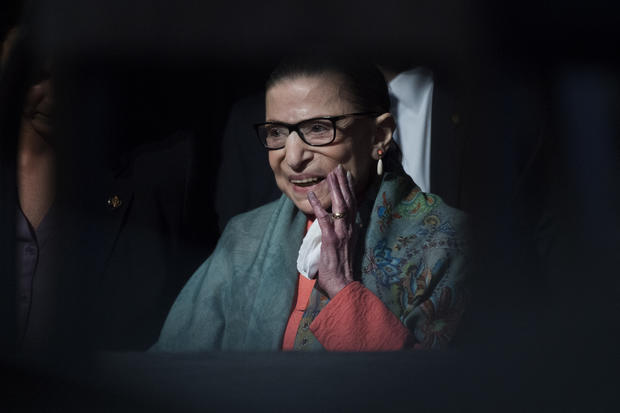Late Supreme Court Justice Ruth Bader Ginsberg Was In Majority On 3 Big Texas Cases
DALLAS (CBSDFW.COM) - This week, Americans are paying their respects to Supreme Court Justice Ruth Bader Ginsburg.
She died Friday at the age of 87.
Ginsburg became the second woman to serve on the nation's highest court and she has received praise from those who supported and opposed her liberal judicial philosophy.
SMU Constitutional Law Professor Dale Carpenter said, "Justice Ginsburg was without any doubt one of the most important figures in the history of the Supreme Court. Even before she got to the court, she was an important trailblazer in advocacy for women's rights, and would be remembered, I think, alone for those accomplishments, much less what she did on the court."
Carpenter said Justice Ginsburg was part of the majority in three Texas cases that made national headlines.
"Those cases are united in the sense that they present very controversial cultural issues that involve gay rights, race and abortion rights. Obviously, these are very contested questions in our society."
Among the cases, in 2003, the Court struck down the Texas law that banned what was called "homosexual conduct." Carpenter said, "That case was really the foundation for much of the gay rights progress to come in the next 15 to 20 years, including especially the marriage decision. Justice Ginsburg was one of the five justices who said, there is a fundamental right of same sex couples to intimacy, just as there is for a fundamental right for married couples and unmarried couples for heterosexuals."
In 2016, Ginsburg was part of the Court's majority on two cases impacting Texas:
They included upholding the University of Texas policy of considering affirmative action in admissions.
Carpenter said, "She believed that there were certain injustices, racial injustices in the history of the country that had to be corrected, and we couldn't just await time to correct them. There had to be some kind of affirmative action by the government to take race into account in a way that would benefit people who had previously been discriminated against."
Days later, Ginsburg was part of the majority that ruled against the State of Texas and its regulations on how abortion clinics could operate.
As a result of the rules, there were fewer clinics statewide performing the procedure.
The Supreme Court ruled against Louisiana's similar law this summer, with the support of Chief Justice John Roberts.
Carpenter said, "With Justice Ginsburg gone, it's now again a four-to-four split. So depending on who joins the majority now, even Chief Justice Roberts may not be able to save these abortion regulations for abortion-rights advocates."
Justice Ginsburg was set to hear arguments in another Texas case November 10, one week after the election.
At issue, whether the individual mandate of the Affordable Care Act, also known as Obamacare, or the entire law is unconstitutional.
Texas leads a number of states that want to strike-down the law, while California leads a number of states that want to uphold it.
If President Trump nominates and Senate Republicans quickly confirm a new Justice to fill the vacancy left by Ginsburg, the Court will become more conservative.
If the process doesn't happen quickly and takes months, no matter whether President Trump or former Vice President Joe Biden wins, possibly eight Justices will rule on the case this summer.
Professor Carpenter said it was likely Justice Ginsburg would have supported upholding the Affordable Care Act and reversing a lower court's decision to declare it unconstitutional.
"It does not bode well for Obamacare that Justice Ginsburg has died, such that supporters of the law now have to really rest their hopes on the vote of Chief Justice Roberts to do what he can. He has voted by the way to uphold Obamacare on two occasions in the past. So there is some hope, I think that the Democrats may have that he will do so again."
Professor Carpenter said the Court could also decide to rehear the case after the new Justice is confirmed.




